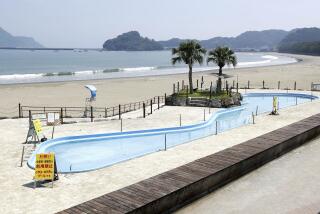Anxiety runs deep, but Tokyo tries to put on a brave face
Reporting from Tokyo — In a city where everything works, suddenly not quite everything does.
It’s little things, mainly. Automatic teller machines that stopped dispensing cash. Bare shelves in the corner store. Speedy express trains to the suburbs supplanted by slowly chugging local ones. A darkened skyline and silent streets.
Residents of this frenetic capital are keenly aware that whatever daily inconveniences they encounter here pale beside the human tragedy spawned by the earthquake and nuclear crisis unfolding 150 miles to the north. In the days immediately following last week’s catastrophic temblor and tsunami, Tokyo felt at times like another world, almost sheltered.
Photos: Earthquake and nuclear crisis in Japan
But now, in one of the world’s most orderly and efficient megacities, every small new breakdown causes a palpable ripple of anxiety. People fear that it’s a sign of far greater disorder to come, and feel powerless to ward it off.
“I didn’t really need the cash, but …” said Hiroko Meiji, her sentence trailing off as she tucked away her bank card. Outside a downtown branch of the Mizuho bank, bowing, apologetic employees were turning away Meiji and other customers. The bank’s nationwide ATM network had crashed for several hours.
Shortages are minor compared with those in the earthquake zone, but add to the general nagging sense of concern. Staples such as milk and rice have all but disappeared amid what appears to be panic buying.
“People are hoarding because they are bracing for what they fear could be another disaster,” said Nobue Kunizaki, who heads the Risk and Crisis Management Education Center in Yokohama. “People want more information, but they don’t seem to be getting it.”
Life suddenly feels strangely unpredictable, stripped of its clockwork trappings. On Thursday evening, the government abruptly warned of the possibility of a widespread blackout across Tokyo after the main utility company declared that the metropolitan area had nearly exhausted its daily allocation.
No big blackout hit the capital, apparently because voluntary rationing by individuals and businesses proved sufficient. But the episode left many Tokyoites wondering whether each day would bring some hasty, ad hoc calculation of electric supplies. It doesn’t inspire confidence that the power provider in question is the Tokyo Electric Power Co., the operator of the now-notorious Fukushima No. 1 (Daiichi) nuclear plant.
Most people are still making their way to work each day. Even a mundane office job can offer distraction from the sense of existential dread here over the possibility of a radiation cloud drifting south from the crippled plant. This week, an extremely small increase in radiation levels — which officials deemed not a threat to human health — kept many people indoors.
Watching for radiation has become like watching the weather. The public broadcaster NHK does a daily rundown of radioactivity levels, and this week it had a segment on how to protect against exposure to radiation, including advice to wear a mask and clothes that cover as much of the body as possible. Also, to not go out in the rain, since because radioactive material is water-soluble and the rain could be contaminated. A Tokyo man has set up a website with a camera pointed 24 hours a day at a Geiger counter.
What were once boisterously crowded public places — noodle bars, pachinko parlors, curry joints — are devoid of customers. One of the few places where there are crowds to be found are the city’s main passport office and the two main airports, where many people are trying to book domestic or international flights out.
In a country where punishing work hours are the norm, many companies are sending employees home early, by 5 p.m. or even earlier. Fewer trains are running to the outer suburbs, meaning long — but always orderly — queues.
And the continuing quakes and aftershocks are like a nervous refrain. When an aftershock rippled through a hotel dining room Thursday night, the lone waiter sent a brief, alarmed glance at a heavy speaker bolted to the wall. Then he quickly rearranged his features, bowed and murmured that everything was all right.
Hall is a special correspondent.
More to Read
Sign up for Essential California
The most important California stories and recommendations in your inbox every morning.
You may occasionally receive promotional content from the Los Angeles Times.










